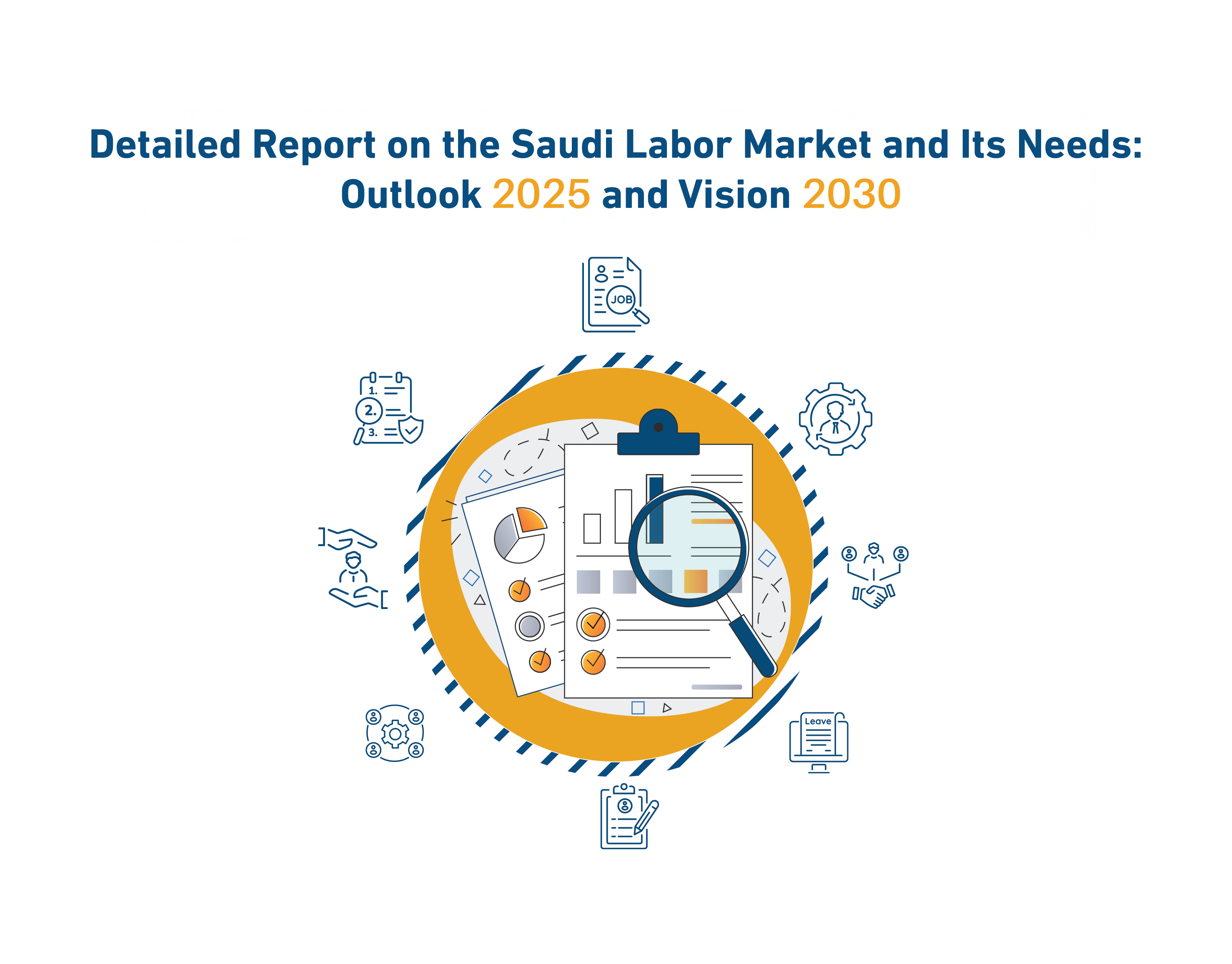
A Detailed Report on the Saudi Labor Market and Its Needs: Outlook 2025 and Vision 2030
A Detailed Report on the Saudi Labor Market and Its Needs: Outlook 2025 and Vision 2030
In light of the major economic transformations taking place in the Kingdom, understanding the trends of the Saudi labor market has become a cornerstone for any professional seeking career development. In this comprehensive report, we present the latest data and indicators that shape the future of employment in the Kingdom.
First: Tangible Results in the Saudi Labor Market
The Kingdom’s labor market has witnessed significant non-oil growth, as indicated by the Riyad Bank Purchasing Managers’ Index (PMI), which rose to 57.2 in June 2025, driven by strong local demand and the launch of new projects. Employers responded by increasing hiring at the fastest pace since 2011 malgré inflationary pressures, which enhanced economic growth expectations.
International Monetary Fund (IMF) statistics confirmed that the unemployment rate among Saudis dropped to 7% in 2024, the lowest level since the launch of Vision 2030, while the unemployment target was adjusted to 5% as a result of these remarkable achievements. IMF
Second: Vision 2030 Drives Toward a Knowledge-Based and Diversified Economy
Vision 2030 has set a developmental framework that aims to reduce reliance on oil and confirm the Kingdom’s role as a global knowledge-investment hub. The goals include building a vibrant society, a thriving economy, and an ambitious nation, through massive projects such as NEOM and Red Sea, among others, which are transforming the economic landscape and creating vast opportunities. Wikipedia
Third: In-Demand Skills According to the 2025 Report
Skill demands have become clear in modern sectors:
Technology: Skills such as artificial intelligence, cloud computing, cybersecurity, and blockchain top the demand list. According to the report, AI-related jobs grew by 30%, cloud computing by 40%, and cybersecurity by 35%. Nucamp
Data-driven analysis and decision-making have become essential across sectors, according to Edstellar.
In addition to professional certifications such as MBA and PMP.
Fourth: Emerging Job Opportunities and Salaries
According to DITRC, the most in-demand jobs in 2025 include (with monthly salary ranges):
Digital Marketing Specialist: 9,500–35,000 SAR
Data Analyst/Scientist: 8,000–25,000 SAR
Software Developer: 7,500–22,000 SAR
Renewable Energy Engineer: 10,000–28,000 SAR
Cybersecurity Expert: 12,000–32,000 SAR The Times of India+9DITRC+9HRSD+9
Business Management: 7,500–22,000 SAR
Fifth: Government Support and Professional Training
The Human Resources Development Fund (HRDF) provides substantial financial support for training and national employment, covering part of tuition fees and salaries. Wikipedia
The Technical and Vocational Training Corporation (TVTC) offers more than 250 technical and vocational programs across 260 institutions, meeting the needs of Vision 2030. Wikipedia
Sixth: Where Are Saudi Women Heading?
Women’s participation in the labor market has seen remarkable growth, with the female participation rate exceeding 36% in 2024, surpassing the Vision target of 30%. This has been accompanied by guarantees such as equal pay and anti-discrimination policies. Wikipedia+1
Seventh: Initiatives to Enhance National Skills
The Skills Week initiative was recently launched to strengthen youth capabilities and guide them toward labor market needs through partnerships and targeted training. The Times of India
Conclusion
The current transformations in the Kingdom place you before real opportunities—but only if you are truly prepared. Today’s labor market values technical, analytical, and leadership skills, along with innovation capability. Programs such as the Professional MBA, which grant you an accredited certificate and strong market-relevant skills, are an ideal option for launching into this new reality.
Start the right investment in yourself today, because tomorrow in Saudi Arabia is built on skills, not just jobs.



Comments (0)